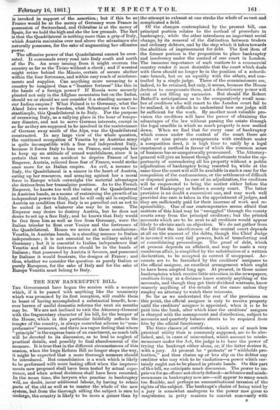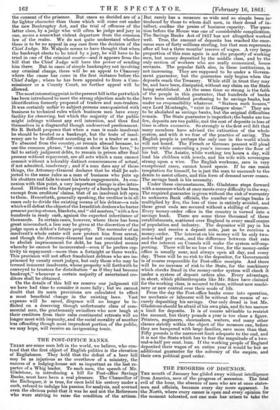THE NEW BANKRUPTCY BILL.
THE Government have begun the session with a measure which, if it be passed with anything like the unanimity which was promised by its first reception, will enable them to boast of having accomplished a substantial benefit, how- ever barren of useful domestic reforms the next six months may be. We are not inclined to twit the Attorney-General with the fragmentary character of his bill, for the temper of the House, which in this particular faithfully reflects the temper of the country, is always somewhat adverse to "com- prehensive" measures, and there is a vague feeling that where "principle" is the express basis of an enactment, so much talk will be devoted to its discussion, as to lead to neglect of practical details, and possibly to final abandonment of the measure. It is true that in the different circumstances of this session, when the huge Reform Bill no longer stops the way, it might be expected that a more thorough measure should be introduced. But consolidation is a work which is likely to be performed with more lasting effect when the improve- ments now proposed shall have been tested by actual expe- rience, and when actual decisions shall have been recorded. In the mean time, the lawyers who practise in bankruptcy will, no doubt, incur additional labour, by having to retain parts of the old as well as to master the whole of the new system, but from the thorough sifting the subject is sure to undergo, the country is likely to be more a gainer than by the attempt to exhaust at one stroke the whole of so vast and complicated a field.
Of the changes contemplated by the present bill, one principal portion relates to the method of procedure in bankruptcy, while the other introduces an important social change, by its removal of the distinction between traders and ordinary debtors, and by the step which it takes towards the abolition of imprisonment for debt. The first item of the former portion is the proposition to place bankruptcy and insolvency under the control of one court in London. The immense importance of such matters to a commercial country render it most desirable that the court which deals with them should no longer be in the position of a subordi- nate branch, but on an equality with the others, and con- trolled by a single judge. Three of the commissioners are, indeed, to be retained, but only, it seems, because the House declines to compensate them, and a discretionary power will exist of not filling up vacancies. But should Sir Robert Bethell's anticipations as to the comparatively small num- ber of creditors who will resort to the London court fail to be realised, it is difficult to understand how one judge will be sufficient for the work. By another most valuable pro- vision the creditors will have the power of obtaining the advantages of the law without passing the estate through the legal crucible in which so much property is now melted down. When we find that for every case of bankruptcy which comes under the control of the court there are eight or nine private arrangements with creditors under a composition deed, it is high time to ratify by a legal enactment a method in favour of which the common sense of business has so unequivocally pronounced. The Attorney- general will give an honest though unfortunate trader the op- portunity of surrendering all his property without a public adjudication of bankruptcy being resorted to, while at the same time the court will still be available in such a case for the compuliion of the contumacious, or the settlement of difficult or disputed points. In case of an adjudication, the creditors will be empowered to bring the matter either before the Court of Bankruptcy or before a county court. The latter provision is no doubt a convenient one, and may work well provided due care is taken in the appointment of judges, and they are sufficiently paid for their increase of work and re- sponsibility. One of our contemporaries seems afraid that matters of this kind may be "smuggled" through the county courts away from the principal creditors ; but the printed accounts which are to be sent to all creditors would appear likely to obviate such an objection. We do not gather from the bill that the interference of the central court depends at all on the amount of the debts, though the Chief Judge is invested with very full powers, both of transferring and of consolidating proceedings. The proof of debt, which at present depends on affidavit, and may be made a very cumbrous affair, is simplified by the substitution of a written declaration, to be accepted as correct if unopposed. Ac- counts are to be furnished by the creditors' assignees to the official assignee, an excellent arrangement which ought to have been adopted long ago. At present, in those minor bankruptcies which receive little attention in the newspapers, creditors living at a distance know scarcely anything of the accounts, and though they get their dividend warrants, know scarcely anything of the details of the cause unless they employ an attorney to watch their interests.
So far as we understand the rest of the provisions on this point, the official assignee is only to receive property until the creditors' assignee is appointed, when it is to be paid into the bank, after which time the creditors' assignee is charged with the management and distribution, subject to accounts and quarterly balance sheets to be required from him by the official functionary. The three classes of certificates, which are of much less practical utility than is commonly supposed, are to be abo- lished, and, in cases of misconduct, which amount to misde- meanours under the Act, the judge is to have the power of trying" the bankrupt either alone, or, if the latter desires it, with a jury. At present he "protects" or "withholds pro- tection," and thus chains up or lets slip on the debtor any creditor who may wish to be vindictive—a power which cer- tainly ought not to be placed in private hands. On this part of the bill, we anticipate much discussion. The power to im- prison for an offence not clearly defined—as felonies and misde- meanours in bankruptcy now are--will appear to many much too flexible, and perhaps an unconstitutional invasion of the rights of the subject. The bankrupt's choice of being tried by a jury is somewhat analogous to the power now given to magistrates in petty sessions to convict summarily with the consent of the prisoner. But cases so decided are of a far lighter character than those which will come out under the new Bankruptcy Act, and the trial of offences of the latter class, by a judge who will often be judge and jury in one, seems a somewhat violent departure from the common law of the realm. We do not quite understand whether there is to be no appeal in any case from the decision of the Chief Judge. Mr. Walpole seems to have thought that when the bankrupt elects to be tried by a jury, he will have to be tried in one of the criminal courts—and it appears from the bill that the Chief Judge will have the power of sending him there. But in cases of simple bankruptcy not involving any criminal charge, there will be an appeal to Chancery where the cause has come in the first instance before the Chief Judge ; where he has been appealed to from a Com- missioner or a County Court, no further appeal will be allowed.
The most interestingpoint in the present bill is the partwhich has been introduced to meet the strong objection made to the identification formerly proposed of traders and non-traders. It was certainly unfair to subject persons unacquainted with business to technical rules which business men have every facility for observing, but which the majority of the public might infringe without any evil intention, and thus find themselves in a disgraceful though undeserved predicament. Sir R. Bethel! proposes that when a man is made insolvent he should be treated as a bankrupt, but the tests of insol- vency are to be different according as he is a trader or not. To abscond from the country, or remain abroad because, to use the common phrase, "he cannot show his face here," to fail to satisfy judgment debts, to remain in prison after final process without repayment, are all acts which a man cannot commit without a tolerably distinct consciousness of actual, if not admitted, insolvency ; and if a man does any of these things the Attorney-General declares that he shall pe sub- jecteceto the same rules as a man of business who puts up his shutters and fails to meet his trade engagements In con- nexion with this point, a very important change is also intro- duced. Hitherto the future property of a bankrupt has been exempt from creditors' claims, that of an insolvent left open to them. Henceforth, generally speaking, the creditor is in all cases only to divide the existing means of his debtor—a rule which will defeat the object of the Israelitish dealerswho barter present paving-stones, blankets, and "old masters," with a few hundreds in ready cash, against the expected inheritance of thousands. In certain cases, however, where there has been great misconduct, a lien may be given at the discretion of the judge upon a debtor's future property. The surrender of an insolvent's whole estate will now protect him from arrest, and though the Attorney-General has not ventured totally to abolish imprisonment for debt, he has provided means whereby he cannot be incarcerated—even if be prefers cap- tivity to repayment—more than a fortnight or three weeks. This provision will not affect fraudulent debtors who are im- prisoned by county court judges, but only those who may be termed innocent insolvents, whose property will forthwith be conveyed to trustees for distribution "as if they had become bankrupt," whenever a certain majority of ascertained cre- ditors shall be obtained.
On the details of this bill we reserve our judgment till we have had time to consider it more fully but we cannot doubt that its main provisions are calculated to effect a most beneficial change in the existing laws. Vast expense will be saved, disgrace will no longer be in- flicted on a deserving though unfortunate class of com- mercial men, the gentlemanly swindlers who now laugh at their creditors from their calm continental retreats will no longer meet with impunity, and the social morality of another less offending though most imprudent portion of the public, we may hope, will receive an invigorating tonic.































 Previous page
Previous page